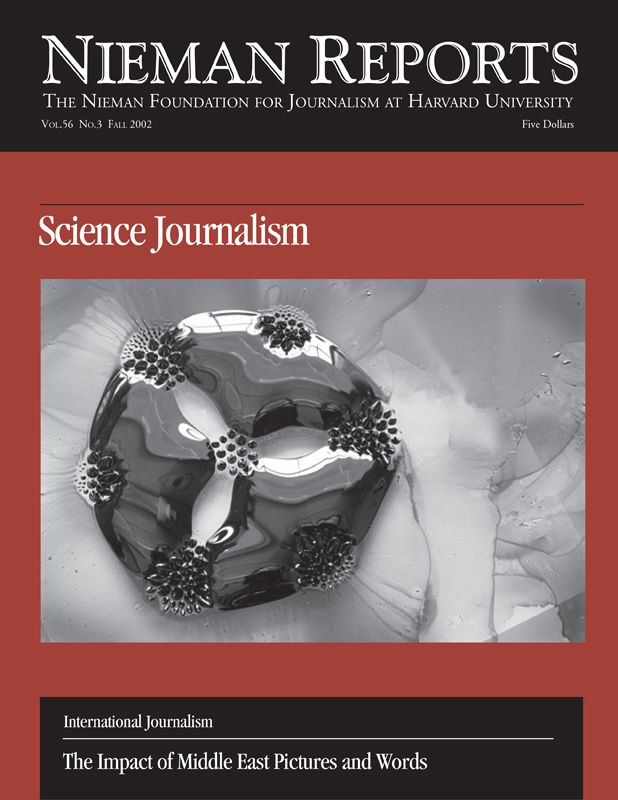As an Arab and an American who has worked for U.S. and Middle Eastern media in the Middle East for most of my 33-year career, I feel that there is a clear pro-Israeli bias in the American mass media as a whole, with some exceptions. But I also believe that this media bias has no particular impact on either U.S. foreign policy or conditions in the Middle East.
On both professional and moral grounds, I’d like the bias to be corrected. More accurate and comprehensive coverage by journalists helps to promote more constructive and satisfying relations between the peoples of the United States and the Middle East. But better, more balanced coverage of Middle East events would have no impact on political trends and policy decisions, since I believe that the forces that define this policy are not directly related to or affected by the media.
I find the pro-Israeli bias in U.S. media reflected in several ways, though it is the overall biased context that defines most news reporting and commentary that I will discuss. During the past two years, this context begins with the following presumption: Security in Israel should be the primary goal of any peacemaking process. Thus, all forms of legitimate (or illegitimate) Palestinian resistance to occupation must cease before progress can be made on achieving a permanent peace accord between Israelis and Palestinians. As a consequence of how this story is framed, we witness bizarre episodes in the story’s coverage, such as an otherwise competent CNN chief foreign correspondent interviewing the Palestinian leader in his Ramallah office, which is surrounded and being shelled by Israeli tanks, and the correspondent asks Yasser Arafat if he is willing and able to stop the violence against Israel.
A more apt context would be the mutual and simultaneous goal of security for both Israel and the Palestinians and recognized statehood for Palestine. In coverage of current events, this would require seeing the Israeli occupation and attacks against Palestinians, and Palestinian attacks against Israelis, as two dimensions of a single conflict.
Yet, because of the current policy perspective, presumption of Palestinian culpability and Israeli innocence permeates and defines most of the U.S. coverage. What this means is that Israeli violence is either ignored or depicted broadly as legitimate because it is a means of self-defense. At the same time, Palestinian violence against Israel is depicted as illegitimate because it is seen as a root cause of a conflict that reduces the chances for a negotiated peace. Of course, there are exceptions to this general practice, with some in the U.S. media offering a balanced view of events. Some American journalists even report news, at times, in a manner that appears more sympathetic to the Palestinians than the Israelis.
Interestingly, the broad pro-Israeli tilt of the U.S. media is found virtually nowhere else in the world. This suggests that U.S. press coverage of the Middle East is the anomaly in a world that otherwise takes a more balanced view of the rights and the misdeeds of both Israelis and Palestinians.
The reasons for this pro-Israeli tilt in the U.S. media are multiple, complex and debatable, and cannot be treated in the limited space I have for this discussion. Instead, I’d like to explain why I feel that the U.S. media’s broad pro-Israeli bias has little impact on U.S. policy or conditions in the Middle East. The main reason is that American voters’ perceptions of events in the Middle East do not determine how they vote in congressional or presidential elections. The exception is some Jewish Americans who do vote on this issue when they feel that Israel is threatened. However, at such a time, virtually all candidates routinely express strong support for Israel. Otherwise, even Jewish Americans tend to vote primarily on the basis of domestic issues and ideology, not on the basis of U.S. policy in the Middle East.
Suppose, for the sake of argument, that the American mass media were broadly pro-Palestinian in their reporting, analysis and comments, and that a majority of Americans felt more sympathetic to Palestinians than to Israelis. What would be the consequence? None, I suggest, because Americans’ widespread sympathies for Palestinians would not translate into voting for candidates who share such views, and thus would not result in changed American government policies.
Americans who feel strongly about Middle Eastern issues do so because of some personal connection, whether it is religious, ethnic, professional or ideological. Their views will not be swayed, either, by media coverage; their firmly held views are formed by factors much stronger than media imagery. Others might be swayed by such media coverage; they will become sympathetic to Palestinians when they see images of their children shot by Israeli soldiers and sympathetic to Israelis when they see images of civilians killed by terror bombings.
By and large, such sentiments are politically irrelevant. The perceptions and sympathies of this large segment of Americans are almost totally detached from the forces of policymaking in Washington, D.C. This is not dissimilar from opposition to child labor in Asia, for example, when sympathies don’t get translated into significant political action (voting, donating to parties or candidates, or lobbying), and thus have no impact on U.S. foreign policy. This disjunction between perceptions formed by media coverage and action in the political arena makes media bias an important professional issue, but not a political one.
Rami G. Khouri, a 2002 Nieman Fellow, is a Jordanian-Palestinian syndicated political columnist and book author, based in Amman, Jordan, and works half-time as a senior analyst for the International Crisis Group’s Middle East Program. He is also chief umpire for Amman Little League baseball. He has a BA and Master’s degree in journalism/political science and mass communications from Syracuse University.



